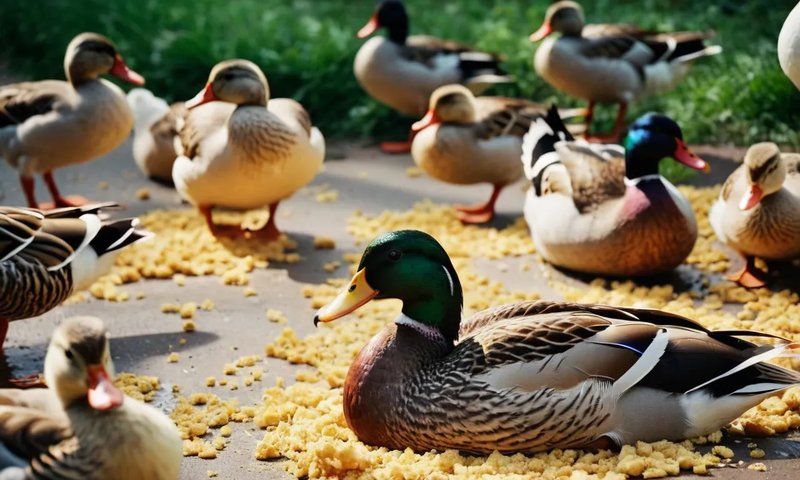
Let’s dive into the world of ducks and explore how to recognize stress and what you can do to help them out. It’s a bit like being a detective, tuning into their behaviors and surroundings to figure out what’s wrong. By picking up on these signals, you can create a more peaceful environment that keeps your ducks clucking along happily.
Understanding Duck Behavior
Before we get into specific signs of stress, it’s important to know a bit about duck behavior. Ducks are social animals that thrive in flocks. They enjoy foraging, swimming, and exploring their environment. *Think of ducks as little comedians; they’re always quacking and waddling around, bringing joy wherever they go.* However, when their routine is disrupted, or they face unfavorable conditions, they can show signs of stress.
You might be wondering how you can tell the difference between normal behavior and signs of distress. Ducks usually display specific signals when something’s not right. They might act a bit different, and their body language can tell you a lot.
Common Signs of Stress in Ducks
So, what exactly should you be looking for? Ducks can communicate their stress in several ways. Here are a few common signs to keep an eye on:
- Isolation: If you notice a duck retreating from the group, that’s a red flag. Ducks are social creatures and prefer to stick together.
- Excessive Quacking: While quacking is normal, if it becomes constant and frantic, it could indicate distress.
- Changes in Eating Habits: A stressed duck may stop eating or drink less water. This can lead to further health complications.
- Feather Loss: Ducks might start losing feathers when stressed, a condition known as feather pecking. This can be both a cause and a symptom of stress.
Each of these behaviors can give you clues about how your ducks are feeling. Keeping a close watch on their daily habits can help you catch any issues early.
Environmental Factors Contributing to Stress
Environmental stressors can have a big impact on your ducks’ well-being. Think of it like living in a noisy neighborhood; it’s hard to relax with all that racket! Here are some common environmental factors that can cause stress in ducks:
- Space: Ducks need room to roam. Crowding can lead to fighting and competition, which increases stress levels.
- Noise: Loud or sudden sounds, like barking dogs or construction, can frighten ducks and lead to anxiety.
- Temperature Fluctuations: Ducks thrive in stable temperatures. Extreme heat or cold can cause them to feel uneasy.
- Predators: The presence of predators (even if just sounds of them) can make ducks feel threatened and stressed.
Checking the environment regularly can help to minimize these factors, creating a more tranquil setting for your feathered friends.
How to Help Stressed Ducks
If you’ve noticed signs of stress in your ducks, don’t worry! There are plenty of things you can do to help them feel more at ease:
- Increase Space: Make sure they have enough space to move around freely. This can reduce competition and stress.
- Provide Hiding Spots: Adding plants or structures where they can hide can help them feel secure.
- Reduce Noise: If possible, try to limit loud noises around their living area. Creating a quiet, calm environment is key.
- Maintain a Stable Temperature: Ensure their shelter is well-ventilated and protected from extreme weather.
These small adjustments can make a big difference in your ducks’ happiness and health.
Feeding and Nutrition Basics
Good nutrition plays a crucial role in stress management for ducks. A balanced diet helps keep their bodies strong and their minds calm. If their diet is lacking, it can contribute to stress levels. Here’s what you should focus on:
- Diverse Diet: Ducks need a mix of grains, vegetables, and protein to stay healthy. Consider providing high-quality duck feed with added nutrients.
- Fresh Water: Always ensure they have access to clean and fresh water. Dehydration can lead to stress and health issues.
- Foraging Opportunities: Allowing your ducks to forage can reduce boredom and encourage natural behaviors, which is great for their mental health.
Providing the right nutrition can help prevent stress before it starts.
Social Interaction and Play
As social animals, ducks thrive on interaction—not just with each other, but with you too! Consider incorporating more social activities into their daily routine:
- Group Activities: Encourage your ducks to interact with one another through games or by adding new toys to their environment.
- Spend Time with Them: Regular, gentle handling can help reduce anxiety. Just like us, ducks enjoy companionship.
- Introduce New Friends: Adding companions can help alleviate loneliness but do this cautiously to avoid overwhelming them.
Creating a vibrant community for your ducks can boost their spirits and keep stress at bay.
Monitoring Duck Health Regularly
Remember, keeping an eye on your ducks is an ongoing process. Just as you might regularly check in with a friend to see how they’re doing, you should do the same with your ducks. Here are some tips for monitoring their health:
- Daily Observations: Look for changes in behavior or appearance, such as feather condition or appetite.
- Regular Vet Check-ups: Schedule routine veterinary visits to address any potential health issues before they become serious.
- Watch for Sick Ducks: If any duck appears ill or shows sudden behavioral changes, separate them from the group until they recover.
By staying proactive and attentive, you can catch any signs of stress early and ensure your flock remains healthy and happy.
Creating a Stress-Free Environment
Incorporating all the above tips can help create a serene haven for your ducks. A stress-free environment leads to happier ducks, which means more joyful quacking and waddling around your yard. Here are some final thoughts on setting the stage for success:
- Consistent Routine: Ducks thrive on routine. Keeping feeding and care times consistent can help them feel secure.
- Engaging Environment: Use things like pools for swimming, plants for shade, and toys for entertainment to keep them engaged.
- Caring Companionship: Spend quality time with your ducks. This not only helps them feel comfortable but also strengthens your bond.
The more effort you put into their environment and well-being, the better they’ll thrive.
In conclusion, understanding the signs of stress in ducks and knowing how to help them is vital for any duck owner. By tuning into their behaviors and following these tips, you can provide a nurturing environment that keeps them content. Think of it as creating a little duck paradise—where they can thrive and quack happily for years to come.

